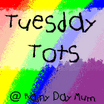A friend of mine, and a lifelong friend of my husband, asked me about the effects of different languages on children's speech. She is from the United States, but her husband is from Cuba. She has just started a blog, La Americana, about her mixed household and the blending of two cultures and two languages among five family members. I will feature her blog post next week about this topic since it relates to so many families.
Many parents want to expose their toddlers to more than one language but are afraid that doing so may cause a language delay. Children, especially toddlers, are like sponges. They soak up everything they hear and see, so this is a perfect age to teach them more than one language.
If you do suspect that your toddler has trouble communicating with you, experts suggest that you speak with your toddler in the language you're most comfortable with. That language may be English, Spanish, French, etc, even if a different language is spoken at school. If you think your toddler has a language deficit in one or both languages please seek the help of a certified speech-language pathologist. You can find out how to locate a local SLP by reading my blog post, Help! My Toddler Is Not Talking.
For more information on learning two languages please check out this article on the American Speech-Language Hearing Association Website, Learning Two Languages.
To learn easy and practical speech and language tips to help your toddler talk and communicate faster, be sure to check out my book on Amazon Kindle, Talking With Toddlers - 52 Tips to Boost Speech and Language Skills.
|
1 Comment
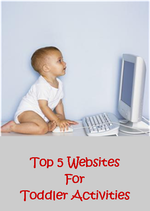 There are so many fantastic activity websites for toddlers on the internet. There’s a whole new world of activities ranging from arts and crafts to messy play. You can use these activities for rainy days, hot days, or any day that you want to give your toddler something creative to do. Keep in mind that all of these activities can be used to build your toddler’s speech and language skills such as following directions, describing, and conversation. Here are some of my favorite websites:
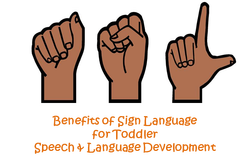 One of the best things you can do for your baby or toddler is to teach him or her sign language. Not only is sign language fun, but it’s also a great bonding experience for you and your child. Many babies are learning sign language and are able to communicate their wants and needs before they are even able to speak. However, some parents are concerned that sign language will hinder speech development. Don’t worry, it won’t! Research has shown that sign language builds speaking skills, and some toddlers who sign may start speaking sooner. Here are some great benefits of using sign language with your toddler:
Some of the best signs to start with are “more”, “all done”, “eat” and “drink” because they cover some of your toddler’s basic needs. Other good signs to teach your toddler include “yes”, “no”, “milk”, “mama”, and “daddy.” You can learn how to sign some of the signs listed above and get a free sign language printable chart by visiting this website: http://www.babysignlanguage.com/wp-content/uploads/chart/baby-sign-language-chart-us.pdf To learn more speech and language tips to help your toddler talk and communicate faster, be sure to check out my book on Amazon Kindle, Talking With Todders - 52 Tips to Boost Speech and Language Skills. Happy signing! 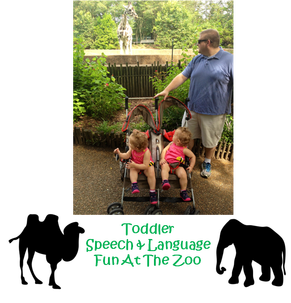 Last weekend, my husband and I wanted to take our 18 month old twin toddlers somewhere special. We decided to take them to the local zoo, which we are so lucky to have in our own city. We really enjoy getting them out and about, and we want to cherish these times of them being so small while we can. They had so much fun and were mesmerized by all of the animals, especially the giraffe (see the picture), bear, and flamingos - which one my twins called a duck…ha! Did you know that the zoo is a great speech and language skill building experience for toddlers? Here are some of the reasons why:
So, make a visit to a zoo near you. There’s nothing better than watching your toddler have fun while learning at the same time! To learn how you can help your toddler talk and communicate faster, be sure to check out my book on Amazon Kindle, Talking With Todders - 52 Tips to Boost Speech and Language Skills. 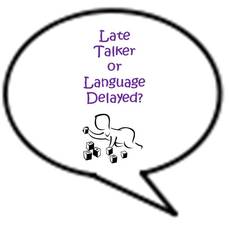 Your toddler wants to communicate, but he doesn’t know how to do it. To get his point across, he grunts, cries, and points to objects he wants. You’ve taken your child to his pediatrician just to be told, “He’ll out grow it.” You may become frustrated when you see other toddlers using words and often ask yourself “Why can’t my child talk?” Your toddler may be considered a late talker. What is a late talker? A late talking toddler is a child 18 months (1 ½ years old) or older who is using a limited number of spoken words for his or her age. Late talking toddlers usually have a vocabulary of less than twenty words beginning at 18 months. Some toddlers speak late due to hearing loss, speech disorders, language disorders, and various diagnoses such as autism, cerebral palsy or Down Syndrome. However, late talking toddlers are usually typically developing in all other skills (fine motor, gross motor, cognition, and social/emotional) but speech. To find out if your toddler is a late talker or may have a language delay, check out this article by the American Speech-Language Hearing Association (ASHA) called Late Blooming or Language Problem? If you are concerned about your toddler's speech and language development it's important to remember that you do have options! You can talk to your child's pediatrician, contact a local speech-language pathologist, or schedule a meeting with your state's early intervention program. I wrote a past blog post that explains how to locate these professionals called, Help! My Toddler Is Not Talking. It's never too early or too late to ask about your toddler's speech and language skills! To learn how you can help your toddler talk and communicate faster, be sure to check out my book on Amazon Kindle, Talking With Todders - 52 Tips to Boost Speech and Language Skills. |
AuthorWelcome! I'm Rebecca Haas, toddler speech-language pathologist and mother to identical twin baby girls. On this blog you'll find articles, resources, and lots of information about early childhood and speech and language development. I hope you find this helpful! Archives
October 2018
Categories
All
This blog is featured on:
|

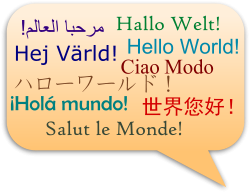
 RSS Feed
RSS Feed



